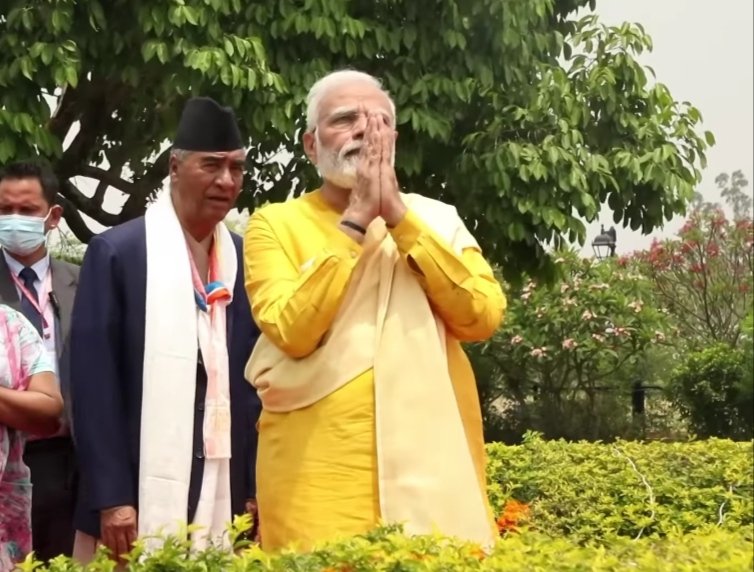India and Nepal have a centuries-long history of cultural, religious, and geographical links. However, in recent years, the dynamics of this partnership have shifted, with tensions, misunderstandings, and increased influence from outsider powers such as China. In this blog article, we will look at the historical ties between India and Nepal, the circumstances that have contributed to the erosion of their relations, China’s rising influence in Nepal, and Indian Prime Minister Narendra Modi’s efforts to rebuild bilateral relationships.
Historical Bond
Deep cultural, religious, and family connections have defined India-Nepal relations. Exchanges between the two nations have long enriched their cultures, resulting in common traditions of art, literature, and spirituality. The open border and unrestricted movement of people have established close relationships between Indian and Nepalese people, fostering a sense of brotherhood that crosses national borders.
The Beginning of Deterioration
Despite their historical links, India and Nepal have had strained relations in recent years. Political issues, such as border conflicts and government changes, have resulted in tensions and distrust between the two nations. The 2015 Indian blockade, which caused great problems in Nepal, increased hate and anti-Indian sentiment among the Nepalese people. Furthermore, perceptions of Indian meddling in Nepal’s internal affairs have stoked nationalist sentiments while destroying faith in India’s aims.

India-Nepal Border 2015
The border dispute between India and Nepal addresses three key areas: Kalapani, Lipulekh, and Limpiyadhura. The issue comes from various interpretations of previous treaties and boundary demarcations, resulting in competing territory claims. According to ancient treaties and maps, Nepal claims sovereignty over these territories in the northwestern section of its country. However, India retains sovereignty of these territories, citing administrative norms and historical usage. The controversy erupted in May 2020, when India opened a new route linking the Indian state of Uttarakhand to the Lipulekh Pass, prompting protests in Nepal. The matter remains unsolved and contributing to tensions.

Lipulekh Border Dispute
China’s Influence
China’s rising influence in Nepal has shifted the dynamic of India-Nepal bonds. Nepal’s growing engagement with China, notably in infrastructure development and economic collaboration, raised alarm in India over Beijing’s strategic encroachment in its neighborhood. Chinese investments in Nepal’s infrastructure projects, such as the Belt and Road Initiative, have brought the country closer to China economically and diplomatically, threatening India’s long-standing regional supremacy.
Why Nepalese Angry on India
Several causes contribute to the rising hatred of India among Nepalese citizens. Feelings of Indian control, historical disputes, and socioeconomic gaps have generated anti-Indian sentiment in Nepalese. The unfair agreements of the past, along with the impression of Indian attitude in dealing with Nepal, have fueled suspicion and alienation among Nepalese people. Furthermore, the Indian government’s response to the 2015 blockade and its aftermath damaged relations and reinforced negative impressions of India.
Why it is Important to maintain its Relation with Nepal
India must maintain a healthy relationship with Nepal due to several reasons. Firstly, Nepal and India share a long and porous border, making mutual stability and collaboration essential for regional security. Furthermore, Nepal’s strategic location between India and China implies that a friendly Nepal acts as a buffer against any prospective Chinese expansion into the Indian subcontinent. However, in recent years, China has increased economic and diplomatic cooperation with Nepal, prompting concerns in India about Beijing’s expanding influence in the area. This emphasizes the importance of India’s ties with Nepal in countering China’s influence and safeguarding its strategic interests.
Furthermore, India’s connections with other South Asian countries faced obstacles. resulting in situations where India has lost influence or had strained relationships with the countries in the region. Political disputes with Sri Lanka and the Maldives, as well as the China-Pakistan Economic Corridor (CPEC) deal, have led to a shift in dynamics, with these nations increasingly moving toward China. Similarly, while India-Bangladesh ties are usually favorable, they have been strained due to concerns such as water-sharing agreements and border conflicts. These incidents emphasize the need of India strengthening its regional diplomacy and maintaining stable ties with neighbors such as Nepal in order to sustain its influence and stability in South Asia.
Efforts to Revive Relation
Prime Minister Narendra Modi has worked to improve India-Nepal ties and resolve underlying problems. India’s diplomatic initiatives, development projects, and cultural exchanges aim to reestablish the trust and increase ties with Nepal.
Statement of Some Politicians

PM Modi Lumbini Visit
Narendra Modi, Indian Prime Minister: “India-Nepal relations are rooted in our shared history, culture, and familial ties. We are committed to deepening our friendship and cooperation for the mutual benefit of our peoples.”
Prachanda, Prime Minister of Nepal: “Nepal and India share a special bond, and it is essential to strengthen our relationship based on mutual respect and cooperation.”
KP Sharma Oli, Former Prime Minister of Nepal: “Nepal values its friendship with India and seeks to enhance cooperation in various fields. We believe in resolving differences through dialogue and understanding.”
My Personal View
While India and Nepal share a rich historical and cultural legacy, recent conflicts and China’s growing influence have strained their relationship, instilling a sense of detachment and hatred among the Nepalese people. It is critical that both countries recognize the seriousness of the issue and take decisive actions to restore trust and improve relations. India’s clear lack of seriousness toward Nepal could have adverse consequences for its strategic interests in the region. Therefore, India must prioritize efforts to enhance its relationship with Nepal, acknowledging the possible consequences of ignoring this important neighbor. India and Nepal might set the road for a more strong and collaborative partnership, which is crucial for ensuring peace, stability, and prosperity in the region.


